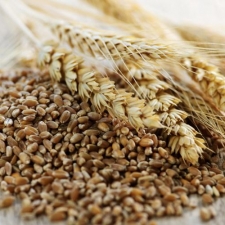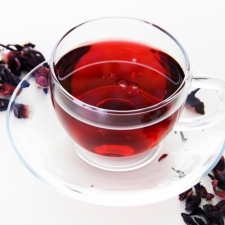Dairy
In a 2012 review and analysis of various studies published in the Journal of Human Hypertension, Australian researchers found a link between the consumption of low-fat dairy and a reduced risk of hypertension. This was seen most strongly with low-fat yogurt and milk (but not cheese). Though calcium may play a role, it's more likely other components of dairy that protect, including compounds such as peptides, released during digestion. Why high-fat dairy may not protect isn't yet clear, but the saturated fat could be to blame. People who consume low-fat dairy also simply may have a healthier overall lifestyle.
Flaxseed
Consuming flaxseed in a variety of foods was linked to a reduction in both systolic blood pressure (when the heart contracts) and diastolic blood pressure (when the heart relaxes) over six months in people with hypertension, according to a 2013 study published in the journalHypertension. Even when study participants took blood pressure medication, they experienced a benefit from flaxseed. It's not clear what in flaxseed may be responsible for the blood pressure reduction, but it may be any or all of these four compounds: alpha linolenic acid, lignans, peptides and fiber.
Consuming flaxseed in a variety of foods was linked to a reduction in both systolic blood pressure (when the heart contracts) and diastolic blood pressure (when the heart relaxes) over six months in people with hypertension, according to a 2013 study published in the journalHypertension. Even when study participants took blood pressure medication, they experienced a benefit from flaxseed. It's not clear what in flaxseed may be responsible for the blood pressure reduction, but it may be any or all of these four compounds: alpha linolenic acid, lignans, peptides and fiber.
Chocolate
Consuming dark chocolate or cocoa products rich in flavanols was linked with some reduction in systolic or diastolic blood pressure among people with hypertension or pre-hypertension (but not normal blood pressure), according to a 2010 meta-analysis in BMC Medicine. Other research has shown that polyphenols (especially flavanols) in cocoa products are associated with the formation of nitric oxide, a substance that widens blood vessels and eases blood flow—and thereby lowers blood pressure. According to the researchers, future studies should investigate whether genetics plays a role.
Olive Oil
A 2012 study published in the American Journal of Hypertension looked at how olive oil might affect blood pressure in young women with mild high blood pressure. Spanish researchers compared a diet of polyphenol-rich olive oil to a diet that didn't contain any polyphenols and their effects on blood pressure over a period of four months. The results: The polyphenol-rich olive oil was linked with drops in systolic and diastolic blood pressure—especially among women with higher blood pressure to start.
Beets
For a 2013 study in Nutrition Journal, Australian researchers looked at the effects of beet juice on blood pressure among healthy life both men and women. Participants drank either beet plus apple juice or plain apple juice, then had their blood pressure monitored over 24 hours. The results: The researchers observed a reduction in systolic blood pressure six hours after participants drank beet juice, especially among the men. Beets naturally contain nitrates, which ease blood pressure.
Pistachios
A 2013 study published in the journalHypertension looked at pistachio consumption and blood pressure. Participants, who had high LDL cholesterol, ate one or two servings of pistachio nuts daily for four weeks. In the end, the lower dose of nuts was better at reducing systolic blood pressure than the higher dose. An increase in the volume of blood pumped from the heart could account for the difference, but it's not entirely clear. Or, pistachio nuts may reduce constriction of peripheral blood vessels.
Pomegranate
Researchers from the United Kingdom looked at the effect of pomegranate juice on blood pressure among young and middle-aged people. Consuming more than a cup of pomegranate juice every day for four weeks was linked to a drop in both systolic and diastolic blood pressure, according to the study results, published in Plant Foods for Human Nutrition. It's not clear what might be causing these reductions, but it may be the potassium or polyphenols found in pomegranate juice.
Fatty Fish
Researchers from Spain, Portugal, Iceland and Ireland published a study in the journal Nutritionthat looked at the impact of a diet including fish on diastolic blood pressure among overweight or obese people on a weight loss diet. Eating fatty fish such as salmon (but not leaner fish, such as cod) three times a week was linked with a reduction in diastolic blood pressure over eight weeks. The researchers say that many previous studies have found that omega-3 fatty acids (found naturally in fish) have a blood pressure-lowering effect.
Whole Grains
A 2010 study published in the American Journal of Clinical Nutrition looked at how eating whole grains affected blood pressure in middle-aged people. British researchers compared a diet of whole wheat (or whole wheat plus oats) to a diet of refined grains. They found that eating three servings of whole grains was linked with a reduction in systolic blood pressure. Exactly why isn't clear, athough other research has pointed to beneficial effects of whole grains on cholesterol.
Hibiscus
For a 2010 study, researchers from the Jean Mayer USDA Human Nutrition Research Center on Aging at Tufts University looked at how drinking three daily servings of hibiscus tea over the course of six weeks changed blood pressure in people with pre-hypertension or mild high blood pressure. They found reduction in both systolic and diastolic blood pressure, especially in people with higher systolic blood pressure to start. Hibiscus tea is loaded with antioxidants, including phenols and anthocyanins, which might explain the effect.
Diet Advice
These are all healthy foods that can be part of your healthy diet, healthy life. But whether any one food can lower your blood pressure isn't entirely clear and will likely depend on a host of variables including your current blood pressure, your genes, other components in your diet, how much of the food you consume and how often.











Không có nhận xét nào:
Đăng nhận xét